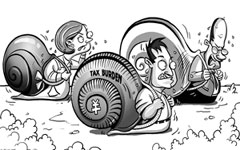Stock-based incentives should be encouraged to attract and retain talent for startups and high-tech companies
More preferential tax treatments should be granted to the equity-based compensation plans of high-tech companies. This is a crucial step for promoting technology innovations in China.
High-tech companies in China are now looking for new ways to attract and retain young, educated, talented and creative employees. To survive in the fierce global research and development competition, they need to motivate talented employees to design or produce high-quality, knowledge-intensive products. But many companies in China find it hard to attract top-notch talent.
 |
 |
Although a relatively unexplored area in typical remuneration packages currently provided by Chinese high-tech companies, offering equity-based compensation for employees could be an effective strategy to ensure successful staff retention in the long run. In particular, stock options and restricted shares can be employed to attract talented employees, and these are crucial tools for startups and small or medium sized companies, which usually cannot offer very competitive salaries.
However, equity-based compensation has not really taken off in China, as yet. Only a small percentage of Chinese companies offer some type of equity compensation scheme for employees and the most common vehicles in China now include restricted stock units and stock options.
Since 2005, the government has offered preferential individual income tax treatment on income from stock options and restricted shares. More specifically, such incomes are taxed separately from normal income and enjoy lower tax rates overall, as regulations allow such incomes to be spread over the period between grant date and vesting date, up to a maximum of 12 months.
